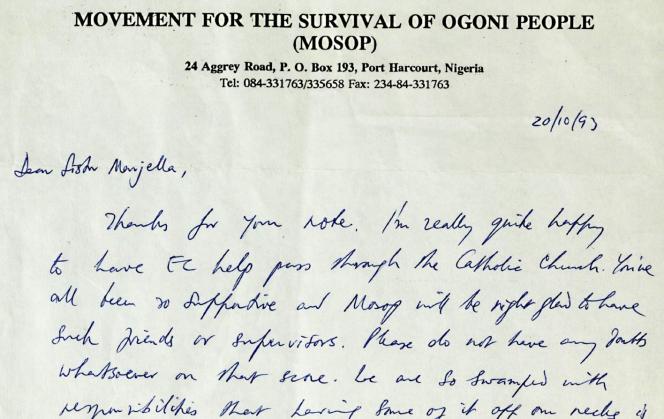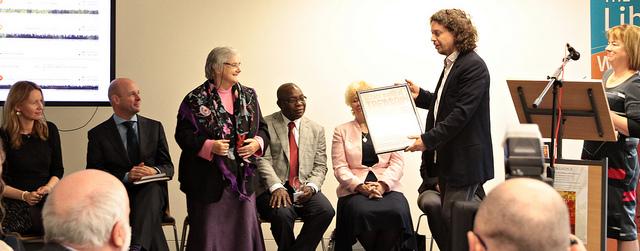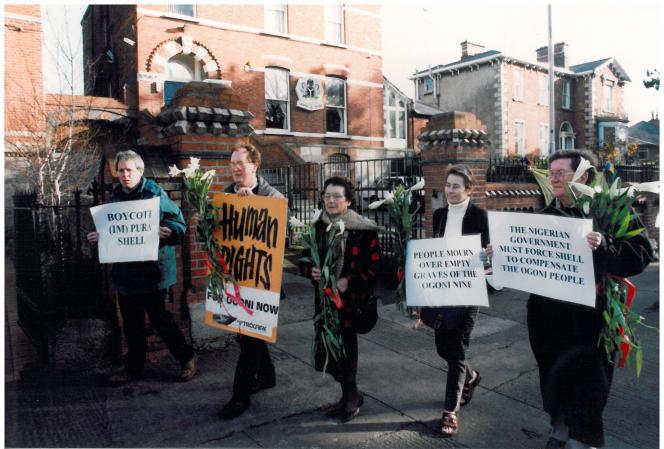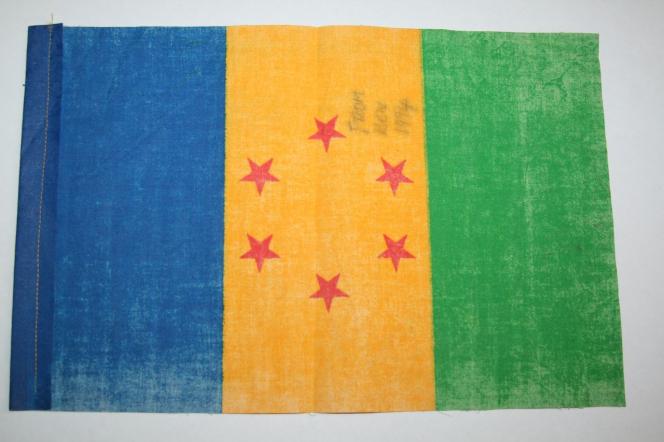A widely celebrated writer, television producer, businessman, politician and activist, Saro-Wiwa was also the founder, in 1990, of the Movement for the Survival of the Ogoni People (MOSOP). In the early-mid 90s, he successfully organised peaceful mass protest against the environmental destruction of his homeland by the oil and gas industry and the “slow genocide” of the Ogoni and other minority ethnic groups in the Niger Delta region. But in January 1993, following a protest march attended by over 300,000 people, MOSOP and the Ogoni population, more generally, suffered increasing political and military repression. Weaponised attacks on Ogoni farmers and fishermen by Nigerian militia, allegedly sponsored by the oil giant, Shell, forced thousands of them into exile in neighbouring Benin and in the West. Following a second period of political detention, Saro-Wiwa himself was unlawfully executed in November 1995 along with eight other MOSOP leaders (who are now collectively referred to as the Ogoni Nine). This led to an international outcry and the imposition of international trade sanctions against the Nigerian state.
At the time of McCarron’s donation in 2011, the Ogoni population who remained in the Niger Delta continued to suffer the devastating impacts of heavy pollution caused by oil and gas multinationals, as they do today. Indeed, earlier that year, the United Nations Environmental Programme (UNEP) had called for emergency measures to protect the Ogoni population along with the establishment of an USD 1 billion environmental restoration fund for their territory to be jointly provided by the oil industry and Nigerian government. The UNEP recommendations were part of the context of McCarron’s donation but have not yet been implemented and since the handover event, Shell Oil has come under even greater international scrutiny.
In November 2018, for example, Amnesty International released a report calling for a criminal inquiry into Shell’s activities in Ogoniland in the 1990s, citing as evidence Shell’s own records, as provided by them in recent court cases. In addition, a major human rights case against the multinational initiated by Ester Kiobel, a widow of one of the Ogoni Nine, is currently in process in the Hague and may have significant impacts for those seeking justice against corporate human rights violations globally. Amnesty’s most recent report, On Trial: Shell in Nigeria, released in February 2020, examines the various cases that Shell is facing in European courts. These relate to (i) its support for a military crackdown against protestors in the 1990s in Ogoniland, (ii) the impact of pollution and Shell’s failure to clean up, and (iii) allegations Shell paid a massive bribe, along with Eni, to secure an offshore oil field, OPL245. These case are coming at a time when the company is positioning itself as a responsible and green energy supplier of the future.
The Ken Saro-Wiwa Archive at Maynooth is thus of significant sociocultural, historical and political import internationally. It contains key documents and artefacts related to Saro-Wiwa’s work with MOSOP in the period leading up and including his final detention. Among the 28 letters to McCarron, for example, the one dated November 14th, 1995 is recognised as his last recorded letter. The archive also contains: 27 poems; photographic evidence of military attacks on Ogoni fisheries, markets and villages by Nigerian produced by Irish volunteers and aid workers who were present at the time; pamphlets, articles and flyers relating to campaigns launched by Irish solidarity workers in Ireland, Nigeria and Benin; Saro-Wiwa’s MOSOP visor cap bearing the motto “Ogoni Must Survive” which he can be seen wearing in extant footage that is widely available on YouTube; and an Ogoni flag signed by Saro-Wiwa for the prestigious Goldman Environmental Prize ceremony.
In view of my research expertise in West African literature and political culture, I was one of three MU staff invited to accept McCarron’s donation on behalf of the university at the handover event and given early access to the letters. Both Laurence Cox (Department of Sociology) and Helen Fallon (Deputy Librarian) also represented the university. Cox, who has expertise in social movements and global justice struggles, had recently researched local opposition to Shell’s land-based refinery in Erris, Co. Mayo. His postgraduate student, John O'Shea, had interviewed McCarron for his Master’s thesis and first suggested the donation. Fallon was herself a personal friend of McCarron and had extensive experience in librarianship in West Africa.
This interdisciplinary team immediately recognised the importance of the documentary contents of this unique archive to the ongoing struggle for environmental justice and human rights in the Niger Delta and quickly moved to publish Saro-Wiwa’s letters and poems. We identified Pambazuka Press as a potential publisher due to its associated open access online Pan-African news organisation, Pambazuka/Fahamu. Firoze Manji, was Managing Editor of Pambazuka Press at the time. A former Africa Director of Amnesty International, he immediately recognised the value of the letters and responded with enthusiasm and support. When he subsequently became Editor-in-Chief of Daraja Press in Senegal, the project moved there. The team obtained legal advice funded by the Bursar’s Office regarding the release of the letters and received the university’s approval. Permission to publish was received from Ken Saro-Wiwa’s family and estate, following a formal request I made.
A paperback volume of the letters and poems entitled Silence Would Be Treason: Last Writings of Ken Saro-Wiwa, named after a line in one of Saro-Wiwa’s poems from the volume, and co-edited by Corley, Cox and Fallon was subsequently project managed and released by Daraja Press under Manji together with the Africa Social Science body, CODESRIA and Action Aid India in 2013. The volume includes three introductory essays by the editors providing a guide to the context, a foreword by the Nigerian poet and activist, Nnimmo Bassey and a poem by McCarron. Through independent research and in consultation with McCarron and Fallon, I also prepared extensive footnotes to the letters. Fallon provided a key to the Maynooth archive intended for researchers and Cox an online “resource toolkit” intended for activists working on related issues. The publication was co-funded by the Maynooth University Library and the Irish aid organisation, Trócaire, who’d actively campaigned for Saro-Wiwa’s release in 1994-5, following a request to Trócaire from Cox
Prior to the launch, I raised a travel fund from the President’s Office, the English department and An Foras Feasa so we could invite the author’s distinguished brother, Dr. Owens Wiwa from Abuja, Nigeria, to Maynooth for the occasion. The Maynooth University Library contributed to the fund. Dr Wiwa is Executive Vice President of the Clinton Health Access Initiative (CHAI) and Regional Director of CHAI in West and Central Africa as well as an internationally-renowned expert on the operations of oil and gas multinationals in the Niger Delta so his visit to the University attracted significant media coverage. This included: interviews on RTÉ’s Drivetime and Newstalk’s Global Village; an interview with McCarron on an episode of iWitness for RTÉ television produced by Dr. Anne O’Brien (Department of Media Studies and formerly, Director of Kairos Communications); an article in the Irish Times and coverage of the launch in over 20 publications in Ireland, Nigeria, the UK and elsewhere. The Irish Times has to date published five articles on the archive. I was later interviewed about Owens Wiwa’s work on the Near FM’s radio programme “Rights Here Right Now”.
Silence Would Be Treason was well received internationally by African writers and academics, including Abdulrazak Gurnah, Brian Chikwava and Biodun Jeyifo who each provided endorsements for the cover. Over 200 hundred people attended the launch, including members of the conservationist group, Shell-to-Sea and the anti-fracking organisation, Love Leitrim as well as Catholic aid workers. Messages of support poured in through social media from Ogoni and Nigeria as well as from diasporic African academics in the United Kingdom, United States and Canada, including an email from the eminent Kenyan writer, Ngugi Wa Thiong’o.
The volume has subsequently been released in two revised paperback editions (2014 and 2017) and has gone through two digital imprints (2017 and 2018) which are available online on open-access. The second digital edition, released in November 2018, includes a new preface by the author’s daughter, journalist and travel writer, Noo Saro-Wiwa and an afterword by Amnesty International’s Business and Human Rights Researcher, Mark Dummett. In the same month, Dummett released the Amnesty report calling for a criminal inquiry into the activities of the Shell in Ogoni.
The publication of Silence Would Be Treason has attracted significant attention to the archive internationally. In November 2015, for example, I was invited to the African Studies Centre at Oxford University to deliver a keynote address on the subject of “Ken Saro-Wiwa’s Last Letters: The Maynooth Archive” at a symposium marking the twentieth anniversary of the author’s execution. The volume has also been the subject of academic analysis in several essays in a recent commemorative issue of Research in African Literatures (48.4: Winter, 2017), the premier journal of African literary studies worldwide, edited by Professor Stephanie Newell (Yale University) including her introductory essay “Ken Saro-Wiwa as Public Intellectual”, Matthew Lecznar’s “‘We all stand before history: (Re)Locating Saro-Wiwa in the Biafran War Canon” and Alexander Fyfe’s “The Textual Politics of Land in the Writings of Ken Saro-Wiwa”.
In collaboration with Anne O’Brien (Department of Media Studies and formerly Director of Kairos Communications), the Maynooth University Library has produced an audio archive which was made available on open access through Soundclound. O’Brien conducted eight interviews with McCarron about her Ogoni-related activities and campaigns in Ireland (30 minutes-one hour) as well as three interviews with Saro-Wiwa’s family members (30 minutes each), two with his brother, Owens Wiwa and one with his daughter, the influential travel writer, Noo Saro-Wiwa, author of Looking for Transwonderland: Travels in Nigeria during their respective visits to Maynooth in 2013 and 2015. I was interviewed for the audio archive on the subjects of Saro-Wiwa’s literary career and language politics and Cox (30 minutes) on the international politics of oil and gas extraction.
The editorial team along with Manji have continuously collaborated and produced a number of additional outputs from the archive as follows:
Silence Would Be Treason Film Rights and Contract: In 2018, Manji as Daraja Editor-in-Chief received a request for film rights to the volume by Atinuke Incorporated, a Los Angeles based film company managed by Nigerian-American actor and filmmaker, Sam Adegoke (primarily known for his role as Jeff Colby in the syndicated soap opera, Dynasty). With the agreement of Saro-Wiwa’s estate, the editors and Daraja Press, a film contract was negotiated via the Maynooth University Bursar’s Office who bore the cost of legal fees. Atinuke now holds a seven year option on making the film. The university acquired a fee of €500 for the first twelve-month of the option period and this has been added to the Ken Saro-Wiwa Award fund. The fund will be enhanced by a total of €2500 should the production go ahead as planned.
The Ken Saro-Wiwa Postgraduate Award: Royalties from Silence Would Be Treason as well as proceeds from the sale of the book at Maynooth University and the travelling exhibition and from the recent sale of film rights to the volume contribute to a postgraduate research fund for research in keeping with Saro-Wiwa’s work and ideals. The fund is primarily administered by the library with input on scholarship applications by the editors. Since Owens Wiwa funded the cost of his flight to Ireland in 2013, €1200 raised by Corley towards his travel fund ultimately became available for the postgraduate award. It was first granted to Graham Kay, a former undergraduate from English and History at Maynooth, now undertaking a PhD in History, to allow him to conduct research in Germany for his PhD thesis entitled, “The First Oil War: Great Britain, Germany and the Race for Oil, 1896-1921”, a context which has continued to shape Nigerian social and political history. The Ken Saro-Wiwa Award fund currently holds over €1000 and the editors hope to offer it a second time in 2020 to mark the 25th anniversary of Saro-Wiwa’s execution.
The Ken Saro-Wiwa Annual Seminar: The editors of Silence Would Be Treason co-organise an annual seminar to mark the date of Ken Saro-Wiwa’s execution. Speakers have included Noo Saro-Wiwa in 2015; Mark Dummett in 2017; and Firoze Manji in 2018. The seminar is generally well attended by local climate activists, including members of Shell-to-Sea and Love Leitrim, as well as Catholic aid workers and members of the African migrant and diasporic communities and wider migrant communities either studying at Maynooth or living in the locality.
Ogoni Bells Are Ringing Travelling Exhibition: In 2016, the library opened a travelling exhibition of archival materials and related history, including four pull-up panels and a series of high quality facsimile reproductions of archival documents and photographs with added captions. The exhibition does not hold any original material so does not require environmentally-controlled cabinets for its display. It first opened at the Arnold Bernhard Library at Quinnipiac University in Connecticut, USA, where it ran from October 4th, 2016-May 5th, 2017. It has since travelled to Wexford where it was exhibited at public libraries in Athy, New Ross and Bunclody in spring 2019 and it is scheduled for exhibition in the Athlone Institute of Technology, Dundalk Institute of Technology and Carlow Public Library in autumn 2019.
Ken Saro-Wiwa Digital Visual Archive: High quality digital images of the letters and selected photographs have been made available on open-access online. Links to other materials including photographs, YouTube videos of events, Library blog posts and other records of events can be accessed via the Maynooth University Ken Saro-Wiwa Library Guide.
Ken Saro-Wiwa’s Last Letters – Digital Exhibition at Illumination: Before its official launch in November 2013, I used the digital images generated by the Library to create an exhibition for Illuminations, the digital-visual exhibition space in the Departments of English and Media Studies at Maynooth, curated by Professor Colin Graham. The exhibition aimed to inform MU staff and students about the literature and politics of oil globally. Trócaire contributed additional photographs and information to it, including images of Ken Saro-Wiwa’s son, Ken Jr’s visit to Ireland after his death in 1995. The exhibition ran from 22nd April-31st July, 2013. Corley also gave a lecture entitled “Ken Saro-Wiwa and the Struggle for Environmental Rights in the Niger Delta at the Maynooth University Library to mark International Human Rights Day that year. This (link to Powerpoint slides) is the first part.
MU Class Visits to the Archive: I have incorporated a visit to the archive into a Third Year seminar class entitled “Black Atlantic Feminist Dialogues”, covering fiction related to the Abacha era by Chimamanda Ngozi Adichie and Noo Saro-Wiwa’s travelogue which recounts the difficult story of her family’s recovery of her father’s bones and his official funeral in Nigeria in 2000. The students responded favourably to the visit in module evaluations describing it as “brilliant and informative” and saying both that it was “amazing to see the real pieces of work and have the chance to read them” and that “physical interaction [with the materials] helps with memory and understanding of what individuals went through”. Philip McDonagh, from the Kennedy Institute for Conflict Resolution at Maynooth University introduced postgraduate students at the institute to the archive during a two-hour postgraduate workshop with the library archivist, Roisín Berry.
School Visits and Poetry Competition: Fallon has arranged visits to the archive by classes from nearby secondary schools, including a group of 25 children with Nigerian backgrounds in July 2016. The children have viewed the letters and been introduced to issues related to the conflicts over natural resources. Fallon also runs an annual school poetry competition on themes related to Saro-Wiwa’s life and goals. In 2019, the competition will be judged by Jessica Traynor, poet and Director Deputy of the EPIC museum of Irish Emigration, whose collection of stories of migrants in direct provision in Ireland jointly co-edited with the actor Stephen Rea, will have been released in mid-October.
Irish Global Solidarity in 100 Objects: Letters and photographs from the Ken Saro-Wiwa Archive were included in this exhibition, which ran from 26th February to 16th March, 2020 in Dublin. It showcased Irish engagement with global, cultural, political and social issues over the last 50 years.





